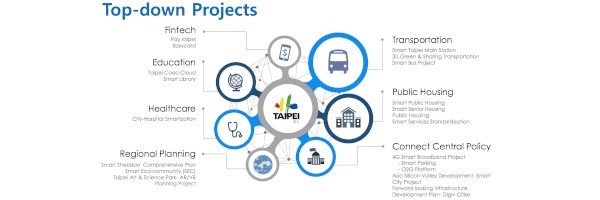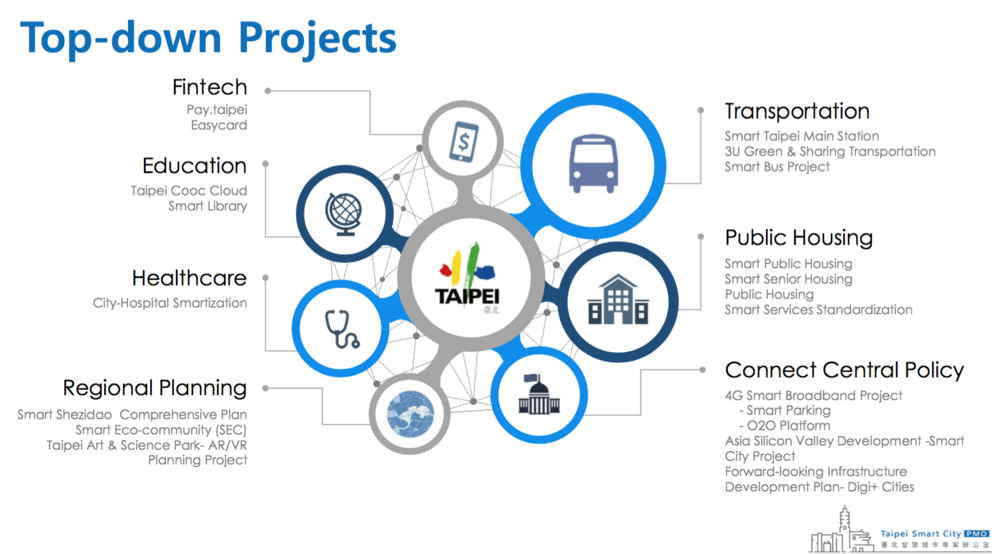Taipei Smart City Programme
| Taipei Smart City Programme | |
|---|---|

| |
 Taipei Smart City Programme | |
| Team Organizations | Taipei Department of Information Technology Taipei Computer Association Deloitte |
| Team Leaders | Hsin-Ke Lu |
| Participating Municipalities | Taipei Taiwan |
| Status | Implemented |
| Document | None |
Description
Taipei Smart City revolves around
- turning the city into a living lab, meaning Taipei City is the test ground for innovative city solutions.
- making Taipei City government function as a platform for city stakeholders to innovate the city, rather than as a planning and directing organisation.
- turn Taipei Smart City into an independent platform, supported by multiple city stakeholders, including the government, industry partners and knowledge institutes.
Challenges
- A major challenge is to continue to change the government culture. Having traditionally been used to planning and directing strategic plans in one direction, the challenge is to open up departments and make them willing to collaborate with partners outside of the organisation. ‘Collaborate’ in this regard meaning to work together as partners, and not as buyer-service provider.
- Another challenge is scaling of projects. Proof-of-Concept projects are started with the idea that if the project is successful, that it will be scaled to the rest of the city. Scaling means that usually more parties will be involved, parties which are not always willing to collaborate.
- The fact that each project involves multiple stakeholders, creates a challenge of bridging between different stakeholders from different backgrounds and with different incentives.
- Collaboration between public and private partners is often limited by regulations, placing strict rules upon what a public institute may and may not do.
Solutions
- Taipei Smart City brokers between government department and outside partners (e.g. companies and universities), to assure strategic interests are aligned. In practice this means that all parties should have an incentive to engage in a project, based on their own interests.
- Taipei Smart City in an early stage already tries to involve stakeholders which may be needed in a later stage of the project, when it comes to scaling. By doing so, it aims to embed projects in the particular stakeholders’ future planning.
- For each case, Taipei Smart City has to clearly indicate the added value of collaboration and show that certain goals for each partner can not be achieved, if not in collaboration with other partners.
- Each project should be executed within the existing regulations. Taipei Smart City tries to maximize the possibilities for each and every case.
Major Requirements
The operation model of Taipei Smart City has so far resulted in more than 160 PoC projects, connecting government and industry. By doing so, the city has been used as a living lab and the government has been opened more for collaboration with outsider parties.
In order to further increase impact in and with the city, Taipei Smart City’s ownership can potentially shift more towards multiple city stakeholders, by:
- Engaging the city government, industry and academic partners to collaboratively operate a Taipei Smart City as a platform for innovation.
- Organising the platform as an independent entity
- Determining a vision and strategy on where the city wants to achieve in terms of innovation relating to sustainability and livability.
- Engaging project partners to initiate projects which contribute to achieving the sustainability and livability goals.
Performance Targets
| Key Performance Indicators (KPIs) | Measurement Methods |
|---|---|
|
|
Standards, Replicability, Scalability, and Sustainability
- Taipei Smart City should solely focus on creating Proof-of-Concept (PoC) projects, which have potential for scaling and replication. Projects which have no potential to scale and/or replicate, should not be started.
- Projects which do not involve multiple stakeholders should also not be started, since involvement of Taipei Smart City is not required if projects only involve two or less stakeholders.
- Projects which do not contribute to the sustainability and livability goals of the city need not be considered.
- Early involvement of stakeholders which are required later in the process for scaling and replicating should be assured.
- PoC project results should be well documented and be made into a guideline for further scaling.
Cybersecurity and Privacy
- Cybersecurity and privacy are issues which touch upon many technology related projects. Based on a database of projects, Taipei Smart City will be able to build a reference framework regarding the role of cybersecurity and privacy in each case. The reference framework will support in determining to what extent privacy should be protected, how it should be protected and when cybersecurity should prevail over privacy.
Impacts
- In order to move the entire city towards sustainability and livability, multi-stakeholder collaboration is key. It is integrated solutions which are really required to make an actual impact on any of the city’s targets, be it in terms of energy efficiency, air quality or transportation.
- Having developed solution use cases for certain challenges, this will support economic growth, as integrated solutions can be exported as ‘packaged solutions’ to other cities.
- Furthermore, expertise on certain aspects of urban solutions, will also increase the excellence of Taipei tested products and services.
Demonstration/Deployment
Taipei Smart City has been launched and more than 160 cases have been initiated based on the PoC model. The workability of Taipei Smart City as a platform can be showcased at the GCTC by means of a presentation, posters and videos.
Certain projects can also be presented separately, showcasing products or services related to certain solutions.
